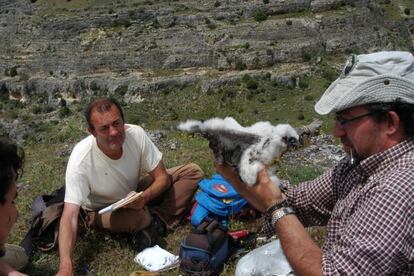National science center biologist "made up" data in science papers
Researcher suspected of inventing facts and citing a "ghost" co-author

Most of the scientific papers published by a researcher stationed at Spain's prized Doñana National Park may contain false data, according to the ethics committee of the Spanish National Research Council (CSIC). The state agency suspects that José Ángel Lemus, a veterinarian who specialized in exotic species, either altered or simply made up data in dozens of bird studies over the years.
If this suspicion is confirmed, it would mean pulling articles from the journals where they were published, including such prestigious magazines as Science. It could also become one of the biggest scientific frauds in Spanish history.
Lemus, a postdoc researcher with a grant to work at the Biological Station in Doñana, was reported last December by his colleagues and superiors, citing a "lack of congruence" in his work. They also asked for advice on how to deal with "publications which have already seen the light."
The CSIC launched a detailed investigation into 36 studies signed by Lemus between 2006 and 2011, some of which made it into international journals. The committee's final report is not ready yet, but the preliminary conclusions suggest that as many as 24 of those papers could contain phony data.
Institutions where the analyses were allegedly done do not recognize their authorship"
Of the 36 published papers under investigation, six were considered "reliable," five were defended by its co-authors, and another one had already been pulled from the journal where it first appeared. All the rest are considered suspicious. The report does not quote any journals where Lemus' work was published, but they include Science, PLoS ONE, Environmental Research, Animal Conservation and Journal of Applied Ecology.
The preliminary report states that "in some cases there are doubts regarding the reliability of the data conducted (or allegedly conducted) by Dr Lemus in the determination of pathogens in magpies and carrion crows." It does admit, however, that "the procedures described in the works conform to the correct parameters in these types of measurements."
The committee found that "there are doubts over the origin of the data" since "institutions and companies where the analyses were allegedly done do not recognize their authorship in said data." Puerta de Hierro Hospital, Complutense University in Madrid, Utrecht University in the Netherlands and a company called Ingenasa did not recognize Lemus as somebody that they worked with at any time.
The CSIC report adds that "there is reasonable doubt regarding the existence of an alleged collaborator who helped obtain data, and who therefore signs several of the papers: J. Grande." Javier Grande signs nine of the articles, sometimes as a researcher at the National Museum of Natural Sciences and other times as a researcher at the Institute on Cynegetic Resources. But neither one of these institutions has any knowledge of his existence. He is a ghost.
This newspaper tried unsuccessfully to reach Lemus for comment. Lemus received a grant in 2010 to work at the station in the Doñana wetlands, but he hardly ever showed up there. He worked from home, and was in charge of the molecular analysis of samples obtained during field work. He signed articles claiming to have found pathogens in a variety of birds, from Egyptian vultures to Spanish imperial eagles. Doñana is a sanctuary for thousands of migratory birds from Europe and Africa.
Tu suscripción se está usando en otro dispositivo
¿Quieres añadir otro usuario a tu suscripción?
Si continúas leyendo en este dispositivo, no se podrá leer en el otro.
FlechaTu suscripción se está usando en otro dispositivo y solo puedes acceder a EL PAÍS desde un dispositivo a la vez.
Si quieres compartir tu cuenta, cambia tu suscripción a la modalidad Premium, así podrás añadir otro usuario. Cada uno accederá con su propia cuenta de email, lo que os permitirá personalizar vuestra experiencia en EL PAÍS.
¿Tienes una suscripción de empresa? Accede aquí para contratar más cuentas.
En el caso de no saber quién está usando tu cuenta, te recomendamos cambiar tu contraseña aquí.
Si decides continuar compartiendo tu cuenta, este mensaje se mostrará en tu dispositivo y en el de la otra persona que está usando tu cuenta de forma indefinida, afectando a tu experiencia de lectura. Puedes consultar aquí los términos y condiciones de la suscripción digital.








































